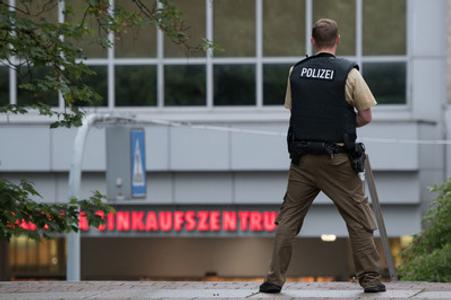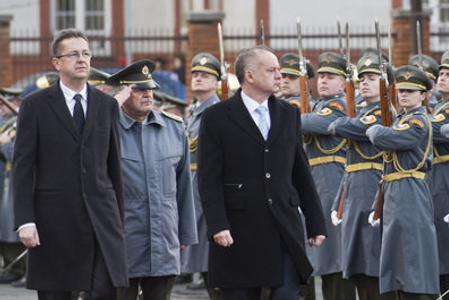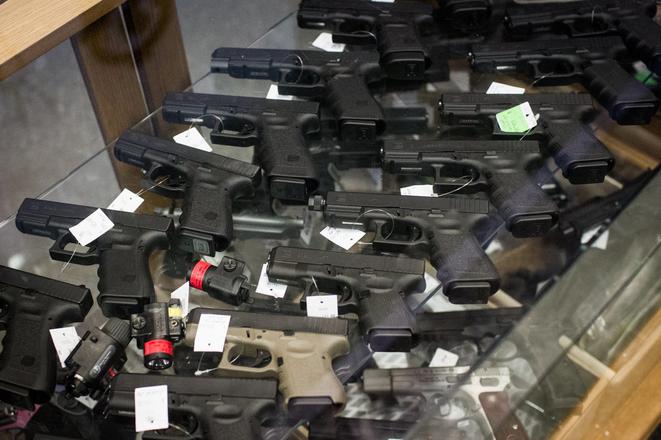The shooting at the Olympia shopping centre in Munich. Killing spree in Charlie Hebdo, France. A terrorist attack in French train. Activities of gangsters in Britain's Kent county and Egyptian people-smugglers in Alexandria. All these events have one thing in common: reactivated Slovak weapons were involved.
Until mid-2015 in Slovakia it was easy to get to cheap lethal weapons which had been deactivated and altered to use only non-lethal ammunition. But it did not take long to activate them again and the Interior Ministry ow admits that loopholes in the earlier law mean Slovak weapons could be used by terrorists again.
Though legislation changed after the Charlie Hebdo attacks, it is still the responsibility of Slovak intelligence to find such weapons circulating in European black market. Moreover, no one has been punished for accepting such a poor law, according to activist and defence analyst Martin Dubéci.
“People all around world are angry that Slovakia was running an online sell off of weapons,” Dubéci told The Slovak Spectator. “It is fascinating that Slovakia has created problem with European-level consequences and no one has been punished.”
Moreover investigative reporters from the Organized Crime and Corruption Reporting Project (OCCRP), Balkan Investigative Reporting Network (BIRN) and the Czech Center for Investigative Journalism found out that supplies of lethal military material worth billions from the Czech Republic and Slovakia are heading to Saudi Arabia.
The Saudi Arabian army, however, does not need such weapons as it is one of the best and most modern worldwide. Therefore it is very likely that it sells them further. Moreover, Germany's secret service -- the BND -- marks the country as a source of instability in the Middle East.

Where weapons come from
The reason behind a steep growth of popularity of expansion weapons in the past was that the state did not think much about security when selling its firearms but rather tried to earn on them, according to security analyst Vladimir Bednár.
The army has been selling its old weapons in large quantities from military stores and private firms then only deactivated them to not serve as live firearms. Moreover the surplus of weapons on the market made them cheap.
“The Slovak specific is firearms deactivated to fire blanks and the problem occurred when people from abroad found that it is possible to reactivate them,” Ľudovít Miklánek of the Firearms Owners Association - Legis Telum told The Slovak Spectator.
The former legislation obliged producers to deactivate firearms in a way that it would be able to shoot only non lethal ammunition. Due to such vague definition producers only installed several pins to the gun barrel. After Slovakia entered the Schengen area criminals found out that it is easy to just change barrel and have legally sold lethal weapon, according Roman Ficek of Legis Telum, consulted on recent changes to the law.
Moreover those weapons did not have to be registered by people who bought them therefore it was difficult to track them.
“Resellers had a man who came to the shop bought expansion weapon; they took it from him or her and the track disappeared,” Ficek told The Slovak Spectator.
Assault weapons for terrorists
Anti-mafia prosecutors in Catania found out that Sicilian mafia Cosa Nostra paid £33,000 (€45,000) for 160 deactivated weapons from Slovakia that experts could make lethal in moments. The track led to Slovak arms dealer AFG Security based in Partizánske, The Guardian wrote on July 24.
The same shop sold its deactivated weapons to resellers who passed them to terrorists involved in Charlie Hebdo and Paris attacks of January 2015 and failed attack on French train in August 2015.
“We have no official information about any illegal re-activating of weapons legally purchased from us in Sicily,” František Gajdoš from the firm AFG told The Slovak Spectator.
When asked about his business by the BBC, Gajdoš said that he sold weapons in accordance with the law and that he cannot be responsible for people who illegally reactivated them.

Solving the problem
All has changed once a new law was adopted in 2015 that rules on deactivating guns more stric. Modifying the gun barrel is not enough anymore; producers have to make serious changes in all parts of weapon. For example, they have to make gun’s mechanism weaker so it will not handle pressure from regular bullet, according to Ficek.
“For the black market it is cheaper to buy weapon somewhere else than to reactivate [Slovak] expansion weapon,” Ficek said.
This however significantly decreased the historical value of such weapons. Collectors appreciated that their mechanics and specific sound remained the same even after deactivation, according to Jozef Hostinský who owns online army shop Tassat and organise historic battles reconstructions.
“The new legislation basically turns even old historical weapons to drilled, milled and welded piece of metal,” Hostinský told the Slovak Spectator. “Their historical value is absolutely destroyed.”
Moreover new owners of expansion weapons have to take over the weapon in person and then register it. It also applies when one person is buying it from another.
Despite compulsory registration, the police are not able to say how much expansion weapons are in circulation. It is not known either how many of them were sold abroad. In mid 2016 there were 4,457 expansion guns officially registered in Slovakia.
“The problem is solved by legislation’s amendment but the damage caused cannot be undone,” Bednár said.
Fico backs arms deals
Profit is also the primary motive for Slovakia to supply old weapons to Saudi Arabia.
An international team of investigative journalists found out that in Slovakia, two unknown Slovak firms Eldon and Kelson mediate trade with Saudi Arabia and supplied there guns worth €50 million. Both firms have the same owner – Ivan Jašek, who has a permanent residence in Banská Bystrica.
Weapons from the Czech Republic and Slovakia are heading to conflict zones in the Middle East not only directly through Saudi Arabia that is not considered a risky trade partner by ministries, but also via the so-called Balkan route through Serbia and Croatia.

Sale of weapons from Slovakia to the Middle East is a trade as any other. Neither the government nor its prime minister can be held accountable if weapons originating from Slovakia emerge in a conflict somewhere abroad, Prime Minister Robert Fico stated, reacting to critical media reports of these sales.
He also rejected being linked with or even awarded responsibility for terrorism in the world because some weapons from Slovakia emerged somewhere.
“Arms are a normal business product,” Fico told the press. “If Slovak firms do not sell them, somebody else will.”



 (source: Sme)
(source: Sme)